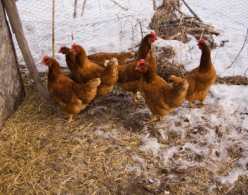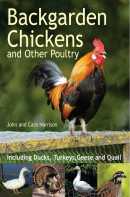The main problem with poultry in winter isn’t actually food, the problem is ensuring they have access to drinking water. Drinkers and ponds can freeze and chickens can’t eat ice or ducks swim in it!
A warm breakfast will help them maintain body heat and condition in the coldest part of winter but you need to be careful to maintain the right balance of vitamins and minerals in the food.
Winter Poultry Feeders & Drinkers
 Once the weather becomes freezing you will notice in the morning that you drinkers and ponds freeze over and if very cold they can refreeze during the day. The drinkers can be wrapped up in a layer of bubble wrap to help prevent freezing and adding slightly warmer water in the morning helps to keep in unfrozen for longer.
Once the weather becomes freezing you will notice in the morning that you drinkers and ponds freeze over and if very cold they can refreeze during the day. The drinkers can be wrapped up in a layer of bubble wrap to help prevent freezing and adding slightly warmer water in the morning helps to keep in unfrozen for longer.
In winter I don’t fill the drinkers to the top so that when the water freezes and then defrosts the expansion doesn’t split the drinker making it un-useable. Proper drinker covers can be purchased online as well to keep the water liquid throughout the winter.
What to Feed Chickens in Winter
Come winter poultry often enjoy warm treats which help to keep their body temperature up. Remember that treats should only be given later afternoon as they still need the nutrients from their main feed in the winter.
I make up a mash porridge in the morning for them by adding warm water and a small handful of porridge oats to a large portion of their pellets and give them this to start them off for the day as well as feeding adlib pellets. In late afternoon I scatter a handful of corn for them to peck at as this helps keep them warm overnight.
Some people like to feed a porridge for the hen’s breakfast just made from oats but the danger is that the hens will fill up on this and not get all the vitamins they require. Layers pellets and mash are formulated to contain all their requirements.
This article is part one of a 3 part series on looking after your chickens and poultry in winter.
- The first part, Keeping Your Chickens Warm in Winter, discusses housing and has a number of tips for dealing with very cold weather.
- The second part, The Chicken’s Garden in Winter, covers ways to keep the garden in some sort of order during winter when the hens can turn it into a mud bath.
- The third part, What & How to Feed Chickens in Winter, covers how to ensure your poultry have enough of the right things to eat and drink in Winter.
More Articles on Keeping Chickens
- 7 Important Things You Need To Take Care Of Chickens
- Chickens Illness & Problems
- Low Cost Hens – Finding Cheap Hens and Housing for them
- Starting Keeping Hens – A Basic Guide
- Chickens in Winter – The Garden
- Back Garden Chicken Keeping – Hens at Home in the Garden
- Low Cost Hens – Feeding Frugally
- Low Cost Chicken Coops – Budget Hen Houses
- Keeping Chickens on a Budget – Getting & Housing Your Hens
- Keeping Chickens on a Budget – Feeding, Watering & Protecting Your Hens
- Keeping Chickens Warm in Winter
- What to Feed Chickens in Winter
- Incubating Chickens & Ducks
- Keeping Chickens for Meat – Costs & Returns – The Economics
- Incubating Chickens & Ducks, Hatching, Sexing & Rearing
- Keeping Chickens for Meat, Table Birds Best Chicken Breeds
- Keeping Chickens for Meat – Raising & Feeding Table Birds


